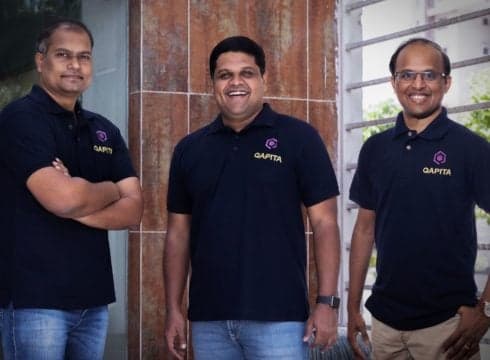Qapita provides equity management software for private companies that includes cap table management and employee stock ownership (ESOP) management
It had earlier raised $15 Mn in funding in the same round, co-led by East Ventures and Vulcan Capital
ESOPs have become a popular tool among Indian startups who want to retain employees against high attrition rates, as well as attract the talent they couldn’t afford otherwise
Inc42 Daily Brief
Stay Ahead With Daily News & Analysis on India’s Tech & Startup Economy
American multinational investment bank Citi has invested an undisclosed amount in Singapore and Hyderabad-based ESOP and cap table management SaaS startup Qapita’s series A round.
Last month, the startup had raised $15 Mn in the same round, co-led by East Ventures and Vulcan Capital. NYCA, MassMutual Ventures, Endiya Partners, Alto Partners, Partners of the Northstar Group, K3 Ventures, Mission Holdings, Avaana Capital’s Anjali Bansal and Sujeet Kumar Udaan’s Sujeet Kumar are also investors in Qapita.
Founded in 2019 by Ravi Ravulaparthi, Lakshman Gupta and Vamsee Mohan, Qapita is a fintech and legaltech SaaS startup that provides equity management software for private companies, with a focus on startups. Its services include cap table management and employee stock ownership management.
Qapita will utilise the freshly raised capital towards their plans of launching a marketplace that will help private companies report and manage all aspects of equity ownership (ESOPs and cap tables); set up and run liquidity programs, and build standardised and scalable rails for private market transactions.
“Our quest is to build a unified platform that addresses all matters relating to equity for a private company. The private market in this part of the world is set to be US$1.0 – 1.5 trillion in value. This market needs an operating system and transaction rails to make it transparent, accessible and efficient,” said Ravi Ravulaparthi, CEO and cofounder of Qapita.
Globally, Qapita competes with San Francisco-based Carta, an equity management platform, and Pulley, another San Francisco-based company that offers a cap table management tool.
Domestically, it faces competition from the likes of LetsVenture, which is a Bengaluru-based fundraising platform that released an ESOP management tool for startups early last year. LetsVenture’s MyStartupEquity allows startup founders and employees to manage their ESOPs.
The pandemic has accelerated an ESOP buyback phenomenon into a marathon among many Indian startups. Back in 2018, hundreds of Flipkart employees became millionaires after Walmart acquired the Indian ecommerce platform.
An increasing number of startups are using ESOPs as a tool for employee retention as well as employee wealth creation—something that is especially true for the ecommerce industry. With junior and middle management attrition rates as high as 15-20% in the ecommerce industry, ecommerce startups often resort to ESOPs to retain employees and attract employees they couldn’t have afforded otherwise.
Earlier this month, Just weeks after announcing a second employee stock ownership (ESOP) buyback plan worth $5.5 Mn, social commerce unicorn Meesho had introduced an annual ‘MeeSOP’ program to facilitate stock ownership for all employees, irrespective of seniority.
According to an Inc42 report, IPO-bound OYO will be covering more than 80% of its employees under its ESOP scheme. Delhivery, the Delhi NCR-based logistics unicorn that is also awaiting an IPO, had allotted 12,17,500 equity shares worth INR 230.8 Cr to 87 current and former employees.
{{#name}}{{name}}{{/name}}{{^name}}-{{/name}}
{{#description}}{{description}}...{{/description}}{{^description}}-{{/description}}
Note: We at Inc42 take our ethics very seriously. More information about it can be found here.


